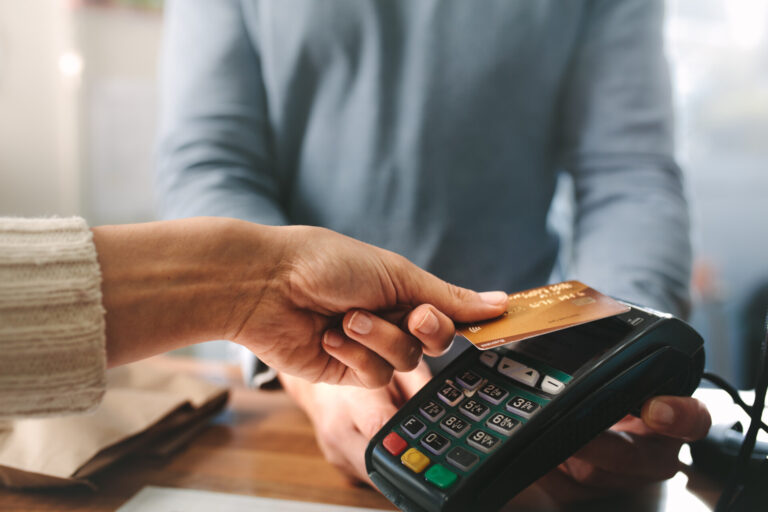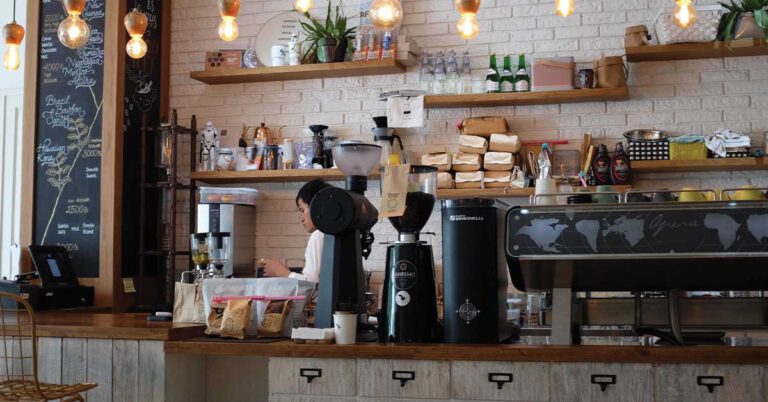For many java junkies, their favorite local coffee shops provide more than just a daily caffeine fix. They’re also places to congregate with friends, meet neighbors, work on their screenplays, novels, and app ideas, and generally experience a sense of community.
But when COVID-19 forced coffee shops to close their cafes and dine-in services, owners had to scramble to figure out how to adapt. Fortunately, many of them were able to innovate in ways that have, in some cases, allowed them to keep generating pre-COVID levels of revenue.
In 2020, Gravity invited several experts from the coffee industry to discuss some of the most creative solutions they’ve seen and share strategies with other shop owners.
The conversation was moderated by Angie McKenzie, a food and beverage consultant, and the panel included Nick Martin, CEO of the mobile-ordering app Joe Coffee; Dane Atkinson, CEO of Odeko; Andrea Ramirez, trends and insights expert at Torani; and Dan Price, founder of Gravity Payments. You can view the full conversation below, but for some of the highlights, keep reading.
The Future of Coffee Shops: What You Can Do
As the panelists pointed out, many of the trends driven by COVID will not necessarily go away once the pandemic is over. As a consequence, there are several things you should be doing to stay nimble and competitive, both now and in the future.
1. Be willing to take risks
“The people who have done the most have been the most aggressive players,” Dane said, citing the example of Go Get Em Tiger, an LA-based shop that decided to transform into a deli and has since almost doubled its average basket size. “Try to find agility in your thinking,” he said, adding that this is especially important given how uncertain the future still remains.
Dane mentioned trying several novel solutions with clients, like selling products out of trucks or trolleys or offering local delivery. Pre-pandemic, these shops never might have considered these initiatives, but now that business-as-usual is a thing of the past, they’ve become essential to their survival.
2. Make it easy for customers to enjoy your products without having to show up in person
Even if you’re open, some customers might not feel safe coming into your shop every day. But that doesn’t mean they can’t enjoy your products. Consider offering large-format drinks–like growlers of cold brew or pre-mixed lattes that customers can buy once and take home.
Likewise, make sure to have plenty of bags of beans on hand so people can brew their own beverages at home. You may even consider offering your favorite grinder or pour-over set for sale as a way to boost revenue and give customers the chance to be their own baristas.
3. Build a community
Customers want to support you and they also want to support their communities. Why not let them do both at once?
Dane said Odeko has worked with some shops to allow customers to buy coffees for healthcare and other front-line workers as well as protesters who are out in the streets. Not only does this provide an additional revenue stream, but it also allows you to serve your community and create connections with new and existing customers.
RELATED: 8 Ways to Build an Online Community for your Small Business.
4. Switch to contactless/mobile payments
When Joe Coffee first launched, Nick said the team knew that mobile-ordering was the way of the future for coffee shops. What they didn’t anticipate was a global pandemic that would shift consumer behavior so quickly. “In a world where folks are wanting to avoid crowded spaces, the appetite for mobile-order ahead dramatically increased,” he said, adding that the number of mobile-order customers increased by twenty-fold nearly overnight.
Contactless payments are not only safe but also convenient, so don’t expect this appetite to diminish anytime soon. “Once you get exposed to a really cool experience, those things are not going to go away,” Nick said. “Consumers are going to continue to want that.”
5. Use technology wisely
Although some technology can help you create a better experience for customers, Dan cautioned owners to avoid adopting technology for efficiency or profitability sake alone. “I’m a fan of technology [like contactless payments] that allows employees to focus on customer experience,” he said. “I want employees to see themselves as that valuable connector,” not just someone designed to fulfill a specific function.
Dane agreed, pointing out that coffee shops should avoid certain technologies – like no-touch dispensers – that provide convenience at the expense of connection. “Our vision of coffee is that it’s part of the human connection,” he said. “No losing humans!”
6. Evaluate your pricing
The pandemic has forced coffee shops to invest in things like new signage and sanitation products that can quickly eat into margins. Although no business owner likes to raise prices, now might actually be a good time to consider it if you’re struggling. “Customers are likely to be understanding right now,” Dan said, and many who are able will be willing to pay a little extra in order to support the businesses they love.
Dane added that many coffee shops actually tend to price their products lower than they should. He cited one client, Birch Coffee in NYC, that recently raised prices on certain specialty drinks while keeping prices low on more basic offerings so that more price-sensitive customers wouldn’t be shut out.
Andrea added that, given how recent layoffs have particularly hurt younger customers who probably don’t have as much of a financial cushion, shops should consider ways they can add value, either by diversifying products or offering different versions of existing ones. Another option is to offer a rewards program.
7. Negotiate with landlords
Most landlords would rather make a deal with you than lose your rental income entirely, so if you’re struggling to make rent, use this time to negotiate a deferral or abatement. If you know other tenants, consider getting together with them to strengthen your position.
8. Tell your story
Personal stories are the most powerful marketing tool you have – especially now.
Instead of posting yet another filtered pour-over picture to your Instagram feed, highlight the personal triumphs and challenges of your team. Where are you struggling? What’s on your mind? Being authentic and vulnerable allows you to truly connect with customers. “Let them know why it’s so important to support small businesses,” Nick said.
9. Take a stand
Another way to create connection is to speak up about social, economic, political, or community issues that are important to you. Customers, especially younger ones, want to support brands who share their values, and there are plenty of ways you can use your platform to make those values known.
Citing his and Gravity’s stance on income inequality – which has gotten worse under COVID – Dan said the risk of speaking up is worth it. “In the past, this was not something you might want to do, but now it’s almost imperative.”
What Does the Future Look Like for Coffee Shops?
Looking to the future, each of the panelists expected the current changes to continue for a long time. “I would expect non-traditional behavior” – like takeout, drive-through and delivery options, and catering – ”to really grow,” Andrea said. “All of our crystal balls are bust,” Dane added. “I don’t think any of us are smart enough to know what’s going to happen, but seeing small businesses invent new things is what will become the next trend. And to put a positive spin on this forest fire we’re all in, those folks who can survive through this, will plant the next garden.”
We at Gravity are rooting for you! To find out more about how we can help your coffee shop save money on credit card fees and provide technology to help you be more efficient, visit our merchant services page or schedule a call with one of our industry specialists.
This post was adapted from “What Comes Next for Coffee Shops After COVID-19,” part of the free Gravity Talks webinar program.




